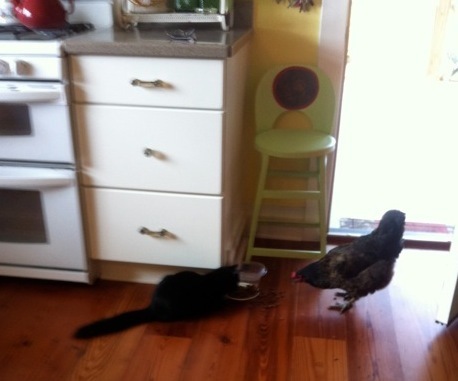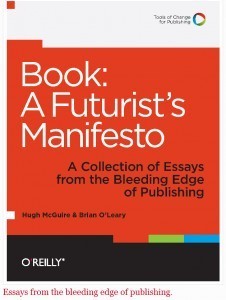Jane Friedman's Blog: Jane Friedman, page 201
November 7, 2011
What Territory Do You Explore With Your Writing?

Photo credit: Laura Dobbs
I love this insight from Laura Oliver on the writing life, in a post called "Territory." She discusses the themes that can permeate our writing, sometimes over a lifetime. (I've also heard this phenomenon called one's "ultimate life concern.")
Here's a snippet:
Most writers have a territory they explore for a time—perhaps an entire career. It is the theme, subject, or question that predominates their work. It might be a belief they hold—love triumphs over all, everyone lies—and it might appear as a question, not an assertion. … This kind of revisiting makes possible a remarkable intensity of observation, which in turn can elevate work to a higher plane. What many writers find is that intense contemplation of a single theme gives a freshness and individuality to each story even when the subjects are similar.
Go read the full piece in the latest Glimmer Train bulletin. Or view the entire bulletin.
November 6, 2011
What's Underrated About You?
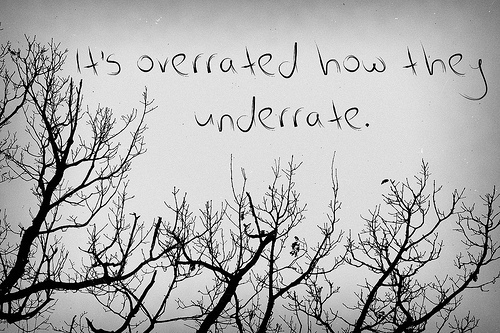
Nocturn Dragon / Flickr
To kick off my Question of the Week series, I asked:
What's underrated about you?
This question was interpreted in many different ways, which may say more about the person than the answer given. For example:
What trait of yours is well-known but undervalued or underappreciated?
What valuable trait of yours do people seem to be unaware of?
What about you is underestimated? (Which seems like a different proposition than underrated)
What quality of yours lies dormant, waiting for the right time to be expressed?
There were a range of humorous responses that identified qualities well-known but underappreciated, such as "my ability to judge whether leftovers will fit into a particular container."
Many responses seemed to express a desire to let people know about a hidden or secret quality that might not be apparent to others, or might not be called into action very often … or qualities taken for granted. Consider the following:
#bbpBox_132154105627025411 a { text-decoration:none; color:#009999; }#bbpBox_132154105627025411 a:hover { text-decoration:underline; }@November 3, 2011 12:56 pm via web Reply Retweet Favorite The Alison
#bbpBox_132158265575477248 a { text-decoration:none; color:#FF0000; }#bbpBox_132158265575477248 a:hover { text-decoration:underline; }@November 3, 2011 1:12 pm via web Reply Retweet Favorite Kat Bryant
Or this one:
My ability to stay married to the same man for forty years. This man, by the way, does not appreciate any of the creative things I do except cook.
—Terry Petersen
Other answers had a touch of defiance—a desire to push back against stereotype or mistaken impressions: I'm not what you think.
My rational side. Just because I'm a "creative, bohemian" type (according to my family) doesn't mean I don't have a strong sense of logic.
—Vanessa Wieland
I can be so ditzy (and I'm blonde) so people often underrate my intelligence.
—Sally Nalbor
My ability to formulate a clear and articulate argument that is counter to the going "intellectual" sentiment—ie, I'm seen as either naive, uneducated, uninformed, or just not aware of what is going on in the world.
—Tammy Servies
My confidence. Many people assume that because you make "too many questions", don't take things for granted or assume a lot of things; you lack confidence. How much confidence can you have if you are engaging in new pursuits all the time?
—Maria Isabel
I hate when people say I am given things with a silver spoon, I just work hard, period.
—Mike Jennings
Some answers seemed to express a quality the individual held most dear, which may or may not be recognized by others …
My decisiveness. I am flexible and am willing to compromise and some interpret that as being indecisive. I can easily make decisions in my best interest when it's appropriate but prefer to take in others' needs and desires when decisions are made that affect others.
—Terry Price
… while this answer expressed a desire for an important quality to find more opportunity for expression:
Underrated about me: my ability to teach and make a difference with children. I want to teach literacy skills including writing, reading, comprehension, and creativity skills. Fear is holding me back and I'm not pursuing that dream right now; aaarrghh! (Now, I'm going to go journal about this … maybe that will help?)
—Pamela Lear
Jean-Paul Sartre once said that "Hell is other people." The truth is, we don't know who we are without other people (1) being who they are and (2) reflecting us back at ourselves. It is both a necessity and an imposition.
And so we come to this answer:
#bbpBox_132157632063602688 a { text-decoration:none; color:#0000ff; }#bbpBox_132157632063602688 a:hover { text-decoration:underline; }@November 3, 2011 1:10 pm via web Reply Retweet Favorite Don Crowder
What do you think? Share your reflection in the comments.
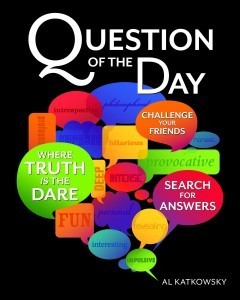 Every Thursday, I pose a question of the week on my social media networks, drawn from
Question of the Day
by Al Katkowsky. Read more here, and follow the chain of answers on Twitter with hashtag #qotw.
Every Thursday, I pose a question of the week on my social media networks, drawn from
Question of the Day
by Al Katkowsky. Read more here, and follow the chain of answers on Twitter with hashtag #qotw.
November 4, 2011
Go Fly a Kite
Today's guest post is by the lovely Darrelyn Saloom. Read her previous guest posts, or follow her on Twitter.
The cat wakes me at six in the morning. She wants to go outside before the sun rises. I don't want to roll out of bed yet. Even the hen is still roosting beside the back door. So I try to coax Nippy with coos and a head massage. She relents and snuggles beside me like a nursing baby with claws. Just as I fall back to sleep, she wakes me again and I get up because it's time to feed the horses and walk the dog.
When I crack open the door, my chicken, Bawk-Bawk, hops off her perch and waddles into the kitchen to share breakfast with the cat. Together they run outside to play. In my pajamas, I head to the stalls to feed the two fillies. Both snort and stomp as I scoop sweet-smelling oats. The two-year-old bangs the revolving feeder until it's full and I swing it to her side. I've nicknamed her "Miss Piggy."

After the horses are fed, I leash the dog and we trot to the backside of the farm. She'd heel if I'd yank her collar and bark, "Heel!" But I've never been strict and prefer to let her roam and sniff and dash through the long, dewy grass. When she stops to snap at a bug, I listen to roosters crowing on the Hamiltons' farm across a road that is only quiet early Sunday mornings.
On the way back to the house, I take my new dog to visit the fillies. She is calm around them now, though she wasn't at first. Sheka is blind—born with no eyes. When she first sensed the enormous equines, she bolted. Now she rubs noses with them. I've introduced her to the critters and taught her the layout of the land. She's taught me about loyalty and to show enthusiasm for the simplest kindness.
I put my new teacher in her kennel and leave feeling guilty. My yard is fenced, but I have to be extra careful she doesn't get lost. Last month, my middle son, Zack, found her ambling down a road, named her, took her to a vet, and tried to find her owner. When no guardian appeared, he brought her to me. Now I take numerous long walks every day.
Back at the house, I brew tea and spread whipped cream cheese on toast. As I enjoy breakfast, I feel an urge to search the internet, read emails, and visit favorite blogs. But I defy the pull of resistance and open a Word document to describe this perfect morning. Temperatures in the seventies, no rain, no contractors knocking on my door to ask about paint colors or hardware.
My husband and I are building a second small house on the farm. We are also building fences and paddocks and repairing barns, so it's been busy and noisy seven days a week since last winter's end. Finding time to write has been hard. Another reason this is a perfect morning—it's quiet and I'm writing for the first time in weeks.
The phone rings, and it's my friend Jimmy Davis. He wants to know if he can come over to fly his kite. Sure, I tell him. I don't think his kite-flying will concern me. Until he says he'll need help, given he sliced two tendons on his left thumb. And, by the way, it's a huge kite, a sunfish or something—the tail is seventy-five-feet long. I try to explain I really need to write today. But my pal's hand is in a cast, and my dog's lessons of loyalty and kindness return to bite me. So I shed my pajamas and dress to go fly a kite.
November 3, 2011
Writing on the Ether
Conference Gemütlichkeit
So when the publishing gets weird, the weird go to conferences. Digital conferences. Transmedia conferences. Convene and confer. Confab and rehab.
Early bird discounts are extended to all. Then simply extended. And extended. Do not attempt to adjust the verticals of F W Media, they're bigger than you. A #toccon is a token of meaningful mingling. AWP 2012 started registration eight, count 'em, eight months ahead this year.
In the last 10 days, San Francisco was host to several conferences of note: the second annual Books in Browsers from TOC-heavy O'Reilly Media and the Internet Archive; the debut transmedia-trek StoryWorld from F W; and the latest in Publishers Launch's eBooks for Everyone Else series.
#bbpBox_131826441804460032 a { text-decoration:none; color:#0084B4; }#bbpBox_131826441804460032 a:hover { text-decoration:underline; }.@about 16 hours ago via TweetDeck Reply Retweet Favorite Simon Staffans
Maybe this is why Publishers Lunch has a section called "People, Etc." I think I sat pretty close to Etc. at StoryWorld.
And I was welcomed into a Parc 55 Wyndham elevator by an Oktoberfestive Lufthansa crew. They'd all brought Lederhosen for Halloween.
We're going as Bavarians!
We wiedersehen-ed each other before I thought to ask whether I existed in their storyworld or they in mine. And after a couple of days' expert debate on the "rabbit hole" of story immersion, I've concluded that rabbits and Bavarians are unusually avid participants in narrative.
#bbpBox_131576151096295424 a { text-decoration:none; color:#2FC2EF; }#bbpBox_131576151096295424 a:hover { text-decoration:underline; }"Darlin', tonight *you're* the rabbit hole." #TransmediaPickupLines #swc11[image error]November 1, 2011 11:39 pm via Twitter for iPhone Reply Retweet Favorite J.C. Hutchins
With conference season flaring to life, I propose a Publishing Conferees' Pile of Wishes for organizers. In the interactive spirit of transmedia, I invite you to join me. For starters:
We need tables. Rows of hotel ballroom chairs are for wedding receptions.
Tablecloths? Tell the hotel no. Or serve us dinner.
We need electrical power sources on all those tables. Don't leave us to our own devices without a way to power them.
I stress power sources on tables. Who wants Etc. crawling around underneath to plug in?
We need enough bandwidth to flame a battleship. Lay it on. You want us tweeting your confab, right?
And we need name tags that don't flip around backward. So we don't hoist ourselves on our own halyards trying to ID our colleagues.
An attendee roster and message system (with opt-out, of course). So we know who's there and can reach them.
And now, add your own requests. Jane's comments area is a storyworld unto itself. Join me in letting our publishing conferences' fine organizers know what you'd like to see at these events.
And we'll start with Books in Browsers, then look at StoryWorld.
#bbpBox_130064271160778753 a { text-decoration:none; color:#B40B43; }#bbpBox_130064271160778753 a:hover { text-decoration:underline; }"don't panic - avoid temptation to jump on every new shiny" - words of wisdom from @October 28, 2011 7:31 pm via TweetDeck Reply Retweet Favorite Kat Meyer
Books in Browsers: buddy system
Maybe it was the great weather, the tasty catering (with options for vegans, of course) or the mere fact that we were in San Francisco, but I found myself longing for a good fiery fight at the Books in Browsers conference last Thursday and Friday. The second-annual event hosted by the Internet Archive and O'Reilly Media featuring a roster of blue sky thinkers, practitioners and visionaries — was surprisingly conciliatory. Happy even. What gives? Isn't publishing in crisis?
Edward Nawotka's look-back is as personable and convivial as the conference, itself. O'Reilly's estimable Kat Meyer and the Archive's Peter Brantley provided a robust live stream of both days. Granted, things got mildly Kumbaya at #bib11. And, yes, the emphasis at times seemed to be "on everything but narrative and storytelling," as Nawotka notes. "Amazon, is being looked on with increasing suspicion … referred to euphemistically as "Our Friends in Seattle".
I recommend Guy LeCharles Gonzalez's gracious Richard Nash on Cursor and the "F" Word on Richard Nash's gutsy presentation at bib11 about his failed Red Lemona.de project. There at Books in Browsers was Nash:
Finally acknowledging his boast of launching 50,000 independent publishers was a bit too, let's charitably call it … ambitious.
And in O'Reilly's archive of the conference videos, you can see Nash's presentation: "Yeah, I know; I f–ked up."
I also like Brantley's enthusiasm in a Publishers Weekly blog post, Libraries: Together or Apart
This is an astounding project–originally designed to work with One Laptop Per Child networks, but made more generic–enabling the placement of digital libraries in the most remote corners of the globe.
Nate Holffelder writes up one of the most succinct presentations of the #bib11 conference in This Could Be (Is) The Future of Digital Comics on a project by Pablo Defendini with Tobias S. Buckell
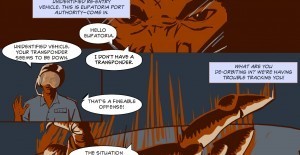
Image from Pablo Defendini's demo for Books in Browsers: Responsive Comic
The reason I like this concept is that he's doing things I haven't seen before in digital comics. The only digital comics I've seen all involved a static page image. Even the ones with directed reading (like comiXology) are based around static page images. Pablo's demo is not.
Here's Defendini's slide set and video of him showing his responsive comic. At around 6:15, watch him shoot his iPhone in action with his iPad's camera for his demo. Surprised chuckles well-earned.
Charlotte Abbott has this write-up on Books in Browsers for Publishers Weekly: Digital Transition Questions Examined at Books in Browsers Conference. David Streitfeld led his piece for the Times, Books Unbound, by sending everyone back to the bar: "Is any form of traditional media under more assault than the book?"
Others I recommend from the conference are the busy Kevin Franco's talk on Personalization in Transmedia Storytelling and Hugh McGuire on The Beauty of Web-first Work Flows.
#bbpBox_129957995588231170 a { text-decoration:none; color:#1F98C7; }#bbpBox_129957995588231170 a:hover { text-decoration:underline; }"p-books"...NOOOOOOO...please start calling them "bound books" it's not much longer falls much more gently on the ear. #bib11[image error]October 28, 2011 12:29 pm via TweetChat Reply Retweet Favorite PubPerspectives
Head spinning yet?
As I fill up your weekend with things to watch and read, I want to suggest you look with special attention at Brian O'Leary's presentation in San Francisco on The Opportunity in Abundance, video or text. O'Leary is our main man in publishing foresight, admired for his unusual ability to gather issues of content and distribution.
Specifically, before we turn to the StoryWorld conference, ponder a set of four defining needs that O'Leary sets up early in his Books in Browsers talk. This is stabilizing as a starting point and seminal for its potential impetus throughout publishing. Here's O'Leary, and the emphasis is mine:
• We need goals, a redefinition of what publishing is and why it matter. That is, we need to reposition publishing as the engine of the engagement economy;
• We need rules, a set of principles that are based in fairness and recognize that we have to balance current requirements with some, perhaps many, future unknowns;
• We need feedback, a shared way to model new approaches, test assumptions and make decisions based in fact; and
• We need a hook, a reason to collaborate
And even more, of great help, from O'Leary and his colleague Hugh McGuire as they roll out their new Pressbooks initiative for multiplatform publication. O'Leary announced at Books in Browsers that Book: A Futurist's Manifesto is readable at no charge. You'll find it moves you forward in your thinking:
The way we think about book, magazine, and newspaper publishing is unduly governed by the physical containers we have used for centuries to transmit information.
#bbpBox_130064372017012736 a { text-decoration:none; color:#009999; }#bbpBox_130064372017012736 a:hover { text-decoration:underline; }"Don't just do it—do it right." @October 28, 2011 7:32 pm via Twitter for iPhone Reply Retweet Favorite Pablo Defendini
StoryWorld: cartographers needed
What I see missing from many of these conversations and theories about multi-platform storytelling is how stories themselves actually build and flourish. Transmedia itself … is often thought of as a series of actions that happen between or across media or the transfer of messages—this isn't "wrong" per se, but it tends to neglect the nuances of human behavior, the levers for why people share stories to begin with and how they connect to each other through different narrative forms.
Gunther Sonnenfeld spoke on a StoryWorld panel called "Measuring Multiplatform IP." (IP, as in intellectual property.) His article, Superstar Beyoncé explained through a narrative ecosystem, might have made a great pre-conference primer for many attendees of #swc11.
The story remains crucial to transmedia. A transmedia project should not originate from the desire to make use of new technology, but from the desire to tell a captivating story.
That's Christine Weitbrecht, who has put together useful recaps of StoryWorld conference sessions here and here.
Weitbrecht's overview capture a sense that the conference was an arrival of sorts for workers in transmedia, and well-earned. Yes, the #bestever! reactions to just about anything that moved were over the top. But no more so than the each session became at times, they were no more over the top than were many of the squeals of delight coming from Books in Browsers. It was also easy to see how much closer to the West Coast and to Canadian production hubs than to New York are some of the understandings here. Nothing wrong with that. I just noted about one wide Biergarten's width between these camps' style and tack and who-you-know.
Legal issues in multiplatform work, potentially spawning any number of revenue streams (may we all be so lucky) can be fiendish. And Simon Pulman, one of my favorite commentators on transmedial issues in New York, wrote well to the point following StoryWorld's legal panel, in Storyworld: Practical Legal Considerations
I began to notice audience members becoming disillusioned and discouraged, particularly when considering the expensive hourly cost of a seasoned attorney. I think it's a dangerous situation to allow fear to chill potential creativity.
And as we all cheered Alison Norrington, whose efforts in pulling off this first StoryWorld were a major niche-triumph, I couldn't help but notice how many StoryWorld speakers made wistful references to maps, especially Tolkien's. There's a longing here for guidance. At least for wider understanding, which StoryWorld can certainly help address over time. As author Bob Mayer wrote, before speaking at the Publishers Launch conference:
Jeff Gomez said that a big problem he sees, particularly in publishing, is that the author isn't involved in the development of the other media. I totally agree with that. A book comes from a single idea the author has. It gets translated into story. The problem is someone taking the story into another medium, might not actually know the original idea. Thus the classic: the book was better than the movie; or the video game.
More commentary, recaps and reviews of StoryWorld are being gathered here by Terre Britten. And Portland-based developer and writer Jason LaPier has been kind enough to pull together my own tweet-storm from the conference, organized by session.
Who would I like to have seen on a panel? James Bridle of London. His presentation back at Books in Browsers, like his article, The New Value of Text, echoes the relentless efforts Norrington makes to root the StoryWorld community in story first, world second. I'll let Bridle play us out of confab city:
Text lasts. It's not platform-dependant, you don't just get it from one source, read it in one place, understand it in one way. It is not dependent on technology: it is what we make technology out of. Code is text, it is the fundamental nature of technology. We've been trying for decades, since the advent of hypertext fiction, of media-rich CD-ROMs, to enhance the experience of literature with multimedia. And it has failed, every time. Yet we are terrified that in the digital age, people are constantly distracted. That they're shallower, lazier, more dazzled.
#bbpBox_129951645789466624 a { text-decoration:none; color:#666666; }#bbpBox_129951645789466624 a:hover { text-decoration:underline; }The "networked #book" posited by @October 28, 2011 12:04 pm via HootSuite Reply Retweet Favorite Porter Anderson
#bbpBox_129950807759138816 a { text-decoration:none; color:#0084B4; }#bbpBox_129950807759138816 a:hover { text-decoration:underline; }I really do feel that books have always been networked, if less visibly, and it is really *us* that are becoming networked now. #bib11[image error]October 28, 2011 12:01 pm via Twitter for Mac Reply Retweet Favorite James Bridle
Your Guardian bot
The Guardian is experimenting with a new Twitter-based service, and would like your help to test it out. @GuardianTagBot is a Twitter account set up for our content API robot, TagBot. If you tweet it with a search term on your phone or online, it will then send you a link to our latest coverage that best matches what you were looking for. It's rather like playing fetch with our articles, videos, galleries and audio.
Potentially an aid in research for writers, the paper in London is Introducing @GuardianTagBot, your new Twitter-based search assistant
#bbpBox_131353969959243776 a { text-decoration:none; color:#FF3300; }#bbpBox_131353969959243776 a:hover { text-decoration:underline; }Fav quote from #swc11 cocktails last night: ebooks are for Tang drinkers, storyboard apps come from concentrate, transmedia is pure pulp[image error]November 1, 2011 8:56 am via TweetDeck Reply Retweet Favorite Bob Carlton
What's the Ether without the aroma of Amazon?
When paidContent's Laura Hazard Owen looked at what track record is discernible, she came up with The Truth About Amazon Publishing:
It will be interesting to see if (Larry) Kirshbaum can use his connections to woo a major fiction author from a traditional publishing house—someone like David Baldacci or Nicholas Sparks. Beyond that challenge, Amazon will have to increase its outreach to bookstores and also solve its Barnes & Noble problem. Sure, it's the digital age. But Amazon Publishing hasn't killed print yet.
Porter Anderson is a Fellow with the National Critics Institute, and a senior producer and consultant formerly with the United Nations World Food Programme in Rome and INDEX: Design to Improve Life in Copenhagen. As a journalist, he has worked with media including CNN, the Village Voice, and the Dallas Times Herald. He's based in Tampa.
Main photo: iStockphoto / sebastian-julian
November 2, 2011
When's the Right Time to Leave Your Big Six Publisher?
I received the following question from published author Lisa Earle McLeod—who I remember first meeting at a Foothills Writers Guild conference in South Carolina:
Hi Jane,
My first book, Forget Perfect, was published by Perigee (Penguin USA) in 2001. It did moderately well. Now 10 years later, as sales were starting to peter out, Forget Perfect was featured on The Today Show and NBC Nightly News, both within the last 30 days.
The book's core message—don't undervalue your own life, instead of trying to do everything perfectly, start defining yourself in the context of a larger purpose—resonates with the cultural climate of our times.
I'm going to update Forget Perfect and relaunch it.
Here's the question, do I do it with Penguin or on my own?
Penguin wants to relaunch it, with a new cover and a new foreword. No additional advance, but the prospect of additional earnings (at the thrilling 7% rate).
But, per the terms of my original contract, I'm within my rights to ask for the rights to be reverted back to me (based on current sales volume).
So I could release it on my own, if I wanted to.
Based on my platform, Internet presence, mailing list and promotion plans, I'm confident that I can generate significant e-book sales.
Should I go with Penguin, or do it on my own?
If I do it on my own, I could generate more revenue and have more control of the process. If I go with Penguin, I have the cache of a big publisher, along with their editorial and cover expertise.
What would you do?
Peace,
Lisa
Wow … only 7%? That's pretty miserable.
The more you have the following things in place—or are ready to jump into action—the more I'd tip in favor of you doing it on your own:
A strong e-mail list with a good open rate (25%+)
Well-established social media network that can help spread word of mouth
The right contacts to help place guest articles/posts on the right sites/blogs that target the book's target audience
An existing website that can be quickly adjusted on the fly to focus on the re-release
A nice backlog of content connected to the book—or re-purposed from the book—that can be excerpted across sites/blogs interested in your work
Resources to hire a good publicist for the first 3 months of relaunch
Resources to hire a good cover designer
I know you're business savvy enough to do this on your own and earn quite a bit of money doing it. The big questions for me would be:
Do you have the time & energy to spend on it?
Do you have the resources to hire help as needed?
I don't think you need Penguin's editorial help if the bulk of the book has already been through the editorial process, or you don't anticipate sweeping changes.
[But, editorial tangent: I'd also be thinking of upsells, e.g., companion workbooks or tutorials or something to make your efforts go even further. You could always hire freelance editorial assistance if necessary.]
I wonder if the publisher would be willing to budge on that percentage if they knew you wanted to do this on your own? Seems silly of them not to offer a better deal, but not surprising.
For readers of this blog, what do you think? Is there a stronger advantage in sticking with Penguin, particularly for physical store distribution, even at 7% royalty? Make sure you check out Lisa's site before giving your final answer!
November 1, 2011
Can Children Develop Adequately Without Books?
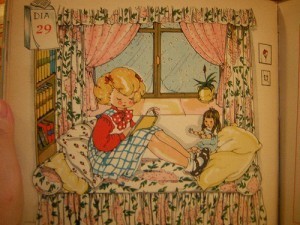
Clair-de-Lune / Flickr
It is a pleasure to bring you this lovely essay from April Line. April is a freelance writer and writing teacher. She lives in north central Pennsylvania. Visit her online at April Line Writing.
Starstruck
The theatrical performance of Max & Ruby: Bunny Party came to my town. I freelance for the arts and culture section of the local rag, and in covering the show, I got to interview Rosemary Wells. I was beside myself.
I hoped maybe some success juju would eke through the phone. I was eager to look inside the mind that penned Ruby, a character who I—as an oldest sister of four—find to be especially sympathetic.
I'm also the mom of a struggling reader and writer. My daughter is 6, in first grade, and she's barely reading at grade level. Watching her write is painful. I want to share my love of books and writing with her, but she'd really rather play. Outside. In the mud. Or watch action-based TV shows. Like Adventure Time and Avatar: The Last Airbender.
I want her to be who she is, not who I am. So I read to her, and help her with her homework, and ask her to do the work of learning to read, but I encourage her to pursue her own interests. Like this: she will soon be taking karate classes.
By the time I was her age, I would come in from school every day, lie on the couch, and read book after book. I was so eager to put words together that I practiced my penmanship. I chose books over TV early on.
Which brings me to Wells.
Here's an unedited quote after I asked her if she ever imagined Max & Ruby would be on TV and in theater:
I'm one of those people who doesn't have TV for kids. I don't believe in TV for kids. I never once thought that it would be on television. I don't think in television, I think in books.
And I think that books (and live theater by the way) are the basis for children's brain development and their spiritual development and their imagination and powers of critical thinking. Very very little of it comes from computers and computer games and television and movies.
I emphasize this because we are fast entering a world where there is just so much screen time for kids. None of this has really been examined over the years. Whether parents really are making a good decision to allow so much screen time, and whether it's just a progress in the technology, or if kids are just falling into it because it's there.
I'm a conservative in this way, in that I think we should always do what we know works, and allow a little bit of the new stuff in. And only when it's appropriate for children. And I must say that the Max & Ruby TV show is perfectly appropriate for children. They've done a really nice job.
The interview went on with lots of little speeches like that, with which my writer half was in agreement, and my mother half was feeling generalized and persecuted.
I agree that people (not just kids) should read more. That TV watching should be kept at a reasonable level. That there is a scary dearth of critical thinking ability all around me, every day.
But we are also increasingly digitizing media. Printed books are going the way of the wooly mammoth, so according them total responsibility for a child's brain and spirituality development seems to be problematic.
The publishing industry is changing with such speed that even its executors can't keep track. Before my first grader is a fifth grader, we will choose from the library of books on her eReader for bedtime literature.
Tablet technology is getting less and less expensive, and computer classes begin in kindergarten. iPads are being used as teaching tools all over the world. This stuff, these screens, are her medium. They will shape an ever-larger portion of her world, like it or not.
And she has absurdly easy has access to so much information. This can't be a bad thing.
As the interview progressed, I felt the need to defend myself. "I read to my daughter!" I said, almost defensively, as Wells made a blanket statement about parents not reading to their kids.
Wells didn't even seem to hear me.
"I do voices and everything!" I said.
"You have to," she said.
In the wake of feeling belittled as a mom and affirmed as a writer and reader, I wondered:
What does the digital media revolution mean for children's books? For children's literacy? Are we heading down a slippery slope of oatmeal-minded buffoonery as a culture? Is Rosemary Wells just a curmudgeon? How do I navigate this transition as a mom? Do I go out and buy an iPad or a Kindle Fire? Boycott Wells? Cling desperately to my printed books and start buying up copies of all my favorites?
Not Answers
I think I landed somewhere between a self-scrutinizing panic and contempt for Wells's arcane argument.
In the usually-less-than hour a day my kid spends in front of the boob tube, she's watching higher quality narratives than I had access to in Avatar: The Last Airbender, with smarter writing in Adventure Time, and a massive variety of animation styles. And Netflix gives me the option to exclude commercials.
I am as excited to see how research happens for my child as I am sad that she won't spend hours in the dusty stacks, jotting notes on recycled card catalog leaves and learning the Dewey Decimal system.
More than being concerned that my sweet kid will think too little, learn too little, read too little, I'm thrilled that she has access to so much. Now is historical nirvana for writers and readers and critical thinkers. And it's my job as a mom to show my kid how to take advantage of it, regardless of medium.
October 31, 2011
How to Sell Low-Cost Subscriptions to Short Stories
I received the following question from Gail McConnon:
Re: Question on Serializing a Short Story Collection through a Paid Subscription
I know. That subject header is enough to make the head spin. Just stay with me for a minute, though. There's something I'd like to do, but haven't a clue where to start. I'm really hoping you have an idea.
I've written a book that is a collection of 50 short stories. My current plan is to sell it as an ebook. Before that, though, I'd like to make the individual stories available for sale—at about $.25 each—by subscription. Subscribers could start and stop at any time. As long as they are subscribed, however, a new story will be delivered to their e-reader or phone at the click of a button. At $.25, people feel almost as if they are getting something for free—which is great. On the other hand, I haven't been able to figure out how to charge only $.25 using any recognized system like Amazon without being permanently impoverished by their charges. A regular membership site might be the best bet, thought the geekification quotient involved in setting such a thing up terrifies me.
(I've also thought of charging $1 for 4 stories, or $2.50 for 10. Some magical system would simply keep track of the money in their account, and let them know when then need to re-up.)
Anyway, does this sound possible to you? And, if so, where to begin? (If your first thought is that I should find a 13 year old to create an app for me … I've already been there. Do you know how expensive smart 13 year olds are?!)
Thank you for any suggestions you can offer.
This presented quite a stumper, and I didn't end up proposing the solution that Gail is now experimenting with, but here's a break down of possibilities (along with Gail's method). If you have suggestions of how this can be done—or strategies to pursue—I hope you'll leave your know-how in the comments.
Possible solutions, but with a caveat
I'm not convinced subscription is the way to go, especially if readers are not already familiar with your work and trust you to deliver a must-read story every time. Also, I don't think the price point is the biggest motivator for readers, at least not in this scenario. Time and energy are big players as well. Readers have to be very fond of you to be constantly pinged with new stuff to read, and to be reminded they're getting charged.
(That's one of the biggest things I learned when running an online subscription service at Writer's Digest: Every time you remind someone they're paying for your content, you'll get drop off!)
Side note: There was a big debate in the journalism/content community about whether micropayment systems would work to "save" newspapers and other subscription-driven publications. Long story short: It does not seem that micropayments are the future, at least for journalism. (But here's a recent article discussing it anyway.)
If you really want to give the subscription idea a shot, though:
Letter.ly . This is a e-newsletter service that allows you to easily charge people to subscribe. That would eliminate any chance of people being unable to read it based on proprietary format or device. One challenge here that Gail points out: Each new subscription would start with wherever she's at in the stories, rather than with the first story.
Ning . You could create a fee-based membership site using Ning without having to know anything about site building or programming. However, this option will cost you money—and costs might outweigh your subscription revenue unless you have hundreds of people ready to pay and keep paying.
E-Junkie . This is an eCommerce tool you can use with your own site to sell digital downloads. It has a lot of features, but it's not something that I've used, so I don't know the ins and outs of how it might work with subscription content. (Perhaps someone could offer advice in the comments if familiar with E-Junkie.)
Alternatives
Price the stories at 99 cents each on Amazon (or Scribd, Smashwords, etc), and use them primarily as marketing and promotion tools for the entire collection. Forget the subscription idea.
Anything that's app-based means you'd exclude readers who do not have a smartphone/iPhone or tablet/iPad. As much news and attention as apps get, it's a small percentage of avid readers who actually have these devices. Then it's even a smaller percentage who are likely to discover and download the app … and then there all kinds of rules about subscriptions sold inside/outside apps, and you don't want to go there. Not when you're charging 25 cents.
What Gail is trying
I received this follow-up from Gail after she sent the question:
I think I may have found the answer. This morning, I came across a write-up on a WordPress membership site plugin called the Magic Members Plugin. It says one can set up a free membership that allows for pay per post access. Granted, this software is designed specifically to get payment for blog posts. However, if stories or story links are posted on a "private" blog, it might just work. And, this service is integrated with MailChimp (which I use) for e-mail delivery. The question becomes, "How low can a price be set to make this a win/win?" Oh, one more thing: It's not a free plugin. Still, I think it may be worth considering.
So now I'll open this situation up for discussion. What do you think the right solution is? Have you tried paid subscription access for any of your content?
October 29, 2011
Balancing DIY With Professional Help
Yesterday was my regular contribution to Writer Unboxed. I discussed how some independent authors are putting their work out there with zero professional help. Here's a snippet:
Working with professionals should challenge you. It should raise the bar. You'll probably feel some doubts about the quality of your work. This is a good thing. Professionals usually understand and build off your strengths, and minimize the appearance of your weaknesses.
One of first things I teach my writing students is you need someone you trust to push you—to tell you where things aren't working. Most people don't have that gift of being so distant from their work that they can see objectively where it's succeeding or failing. Even the writers who DO have that power usually have decades of experience and self-knowledge—from being pushed.
Yes, my argument does mean: To develop to your maximum potential, you need someone to create a little discomfort.
Do-It-Yourself vs. Professional Help
Yesterday was my regular contribution to Writer Unboxed. I discussed how some independent authors are putting their work out there with zero professional help. Here's a snippet:
Working with professionals should challenge you. It should raise the bar. You'll probably feel some doubts about the quality of your work. This is a good thing. Professionals usually understand and build off your strengths, and minimize the appearance of your weaknesses.
One of first things I teach my writing students is you need someone you trust to push you—to tell you where things aren't working. Most people don't have that gift of being so distant from their work that they can see objectively where it's succeeding or failing. Even the writers who DO have that power usually have decades of experience and self-knowledge—from being pushed.
Yes, my argument does mean: To develop to your maximum potential, you need someone to create a little discomfort.
October 28, 2011
I Hate Press Releases

Blank Faces / Rommel Adao
This is part rant, part advice.
I don't write this post as if my needs were everyone's.
But it's frustrating to see authors AND PUBLISHERS—who probably have little time and resource to begin with—wasting their time by contacting bloggers (and others in the media) with dead-on-arrival press releases.
Let's back up for a moment.
What kind of press releases do I receive?
I receive announcements primarily about new books, new products, and site launches. I also get information about author-experts who are available for interview.
When I say "press release," I'm referring strictly to an e-mail announcement that is neither addressed to me personally (beyond an automated greeting line) nor is it seeking to serve me or my audience. It is looking to get something out of me: coverage on my blog or social network.
Why are the press releases I receive typically ineffective?
They are part of a huge and impersonal blast, hoping that a few hits will justify a send to hundreds or thousands of e-mail addresses. For instance, I receive regular blasts from book publishers announcing new releases. But it's hard to feel any excitement at receiving such an announcement when it is not tailored to me, my blog, or my audience. Such releases demand that I make the connection—that I figure out the right angle or fit.
Bad press releases:
Do not address me personally
Don't show awareness of my blog or site
Are far too long, wordy, or boring
Ask me to spend valuable time evaluating something I don't trust yet (e.g., "Review this book!")
Put limitations on what I can or can't do
Do not propose any specific action steps for me to take
Focus on the author/publisher
In other words, I am not treated like a real connection.
Here's an example of a good e-mail I received from a publicist. This was a cold contact, meaning we had never before been in touch. (This is an independent publicist, not a publicist working for a book publisher.)
Hi Jane.
I follow you everywhere and enjoy everything and always learn!
My client, Rochelle Melander, has her 10th book coming out on October 18 from Writer's Digest Books.
The title is Write-A-Thon: Write Your Book in 26 Days (and live to tell about it). Just in time for NaNoWriMo. Rochelle wrote the first draft of this book during NaNoWriMo 2009.
Rochelle's website is www.writenowcoach.com for more info about the book.
We have a press release, bio and book trailer ready to go. Review copies are available digitally and by mail. We like giveaways of the book if that interests you.
Thanks for your kind consideration and I look forward to hearing from you.
Regards,
[contact info]
This is short and to the point. It's clearly suited to my blog and audience. The publicist and author are interested in doing giveaways, but I'm not, so I replied and said I prefer to run excerpts of new releases rather than review them. Anyone watching my blog for a week or two would catch onto the pattern—but that's OK. It was easy to reply, and it felt like this would be an easy thing to run. Once I had a digital review copy in hand, I had control over selecting the best excerpt for my audience. And that's exactly what happened. Easy, fast, and satisfying for all.
Here are 5 reasons I say "yes" to coverage of a book, product/service, website, or author on my blog.
Strong, quality content that will appeal to my audience
I don't have to "work" for the content or create it myself, except in the case of Q&As. (But I usually only run Q&As with authors whom I know already to some extent—or can easily research. I put time and thought into drafting the questions.)
I believe in the author's message, or at least I think it's worth considering/listening to
The content is not going to be duplicated on everyone else's site/blog
I have some control in selection of the content (I choose the excerpt, headline, etc)
Yes, I pay more attention to appeals coming from people I know, or those who are referred to me by people I trust. But I'm happy to be pitched by strangers if I think their content or message is strong and suited to my audience. If I think the content is suspect, even if it's coming from someone I know and trust, I will either reject it or edit it until it's advice or instruction that I would feel comfortable delivering into people's inboxes.
Back to the rant: I've read trend pieces on whether or not the press release is dead. Sometimes I wish they would die, but I also realize they still have a role to play in disseminating official information quickly to specific media channels. But no publicist worth his/her salt ought to be blasting out mediocre requests for coverage to a list of near-strangers. It wastes everyone's time.
I'll always remember publicist Dana Kaye answering a question at the Midwest Writers Workshop, from a writer who asked her how big her contact list is. Kaye rightly pointed out that it's not list size that matters, it's the list quality. Who will actually read her e-mails or take her calls? Can she get people to pay attention? Does she have meaningful connections on that list?
That's where the real value lies—NOT in how many people you can reach with a generic message.
Jane Friedman
- Jane Friedman's profile
- 1882 followers


